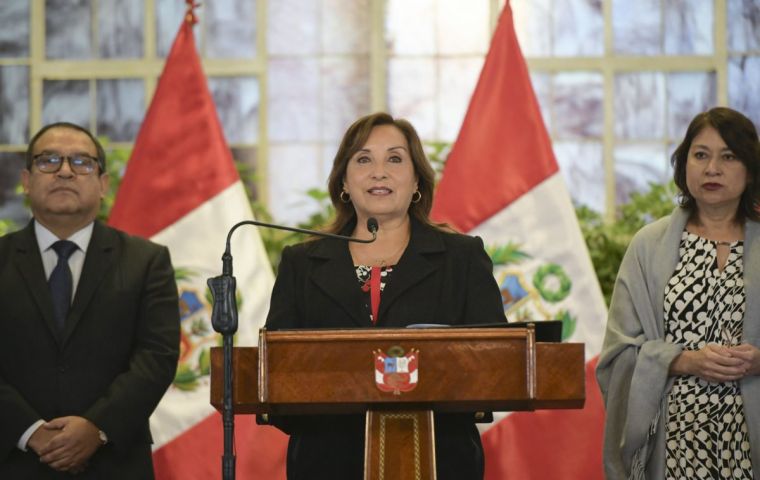MercoPress. South Atlantic News Agency
Peru: Boluarte's gov't targets freedom of the press
 Boluarte's government has downplayed rumors that it might be trying to wage a Bukele-style war on crime
Boluarte's government has downplayed rumors that it might be trying to wage a Bukele-style war on crime Journalist guilds in Peru have expressed their concern about restrictions on freedom the government of President Dina Boluarte is planning to exert through changes to the Penal Code to hold demonstrators and reporters criminally accountable, it was reported in Lima.
“The Executive Branch intends to criminalize people who demonstrate in favor of protests,” stated lawyer Roberto Pereira, legal advisor of the Instituto Prensa y Sociedad (IPYS), a civil organization that fights for the rights of journalism. Last Friday, Congress' Constitutional Committee approved by 18 votes to 4 a bill allowing the prosecution of “communicators” who “incite” acts of protest with their reporting.
“It is clear to us that what is being sought is to limit coverage as much as possible,” National Association of Journalists (ANP) President Zuliana Lainez said. She also that Boluarte's government had already tried to impose cuts in journalistic activity.
A Congressional plenum must still ratify the parliamentarian initiative, which seems likely given the number of Government-loyal lawmakers. The ANP, the IPYS, the Peruvian Press Council, and the Inter-American Press Association believe that if the bill is passed, a wide zone will be created in which reporting will be left up to the magistrates' personal criteria.
“What is dangerous is that the word 'incite' is directly linked to the word 'call',” Lainez stressed. Thus, a journalist who has reported media about a protest could face prosecution for “incitement.”
Despite the administration's pressure for this legislation to be approved, Prime Minister Alberto Otárola stressed that the government does not want to impose restrictions on freedom of the press. “Once again we confirm that there is no relation between what is declared and what is done; we say it clearly: this will criminalize journalistic activity,” Lainez insisted. In her view, the only way to end all doubts is to take back these provisions.
“To approve it as is and give powers to the Executive in this line would be harmful not only for the exercise of freedom of expression but a lethal blow for freedom of the press in this country and for democracy,” she added.
Crime in Peru has been escalating recently, particularly robberies, extortion, and murder-for-hire. In this scenario, Boluarte's government is believed to be seeking extraordinary powers but downplayed rumors that it might be trying to imitate models such as the one of President Nayib Bukele in El Salvador.
Spokespeople of Peruvian right-wing parties have praised Bukele despite criticism from human rights groups. Otárola and Supreme Court Chief Justice Javier Arévalo have also expressed their support for Bukele's approach.
Protests against Boluarte's administration since she took over after the impeachment of Pedro Castillo Terrones have resulted in 49 direct and 77 indirect deaths while human rights organizations such as the Inter-American Commission on Human Rights have reported on excesses by law enforcement officers, in addition to extrajudicial executions. In this regard, photographic and film evidence recorded by news organizations was decisive.




Top Comments
Disclaimer & comment rulesCommenting for this story is now closed.
If you have a Facebook account, become a fan and comment on our Facebook Page!